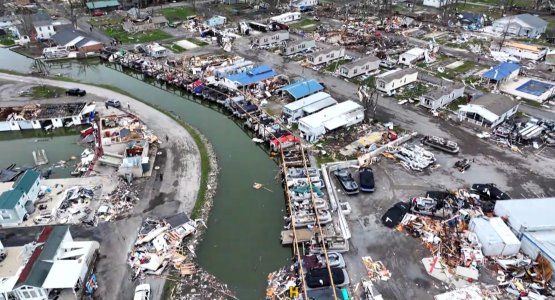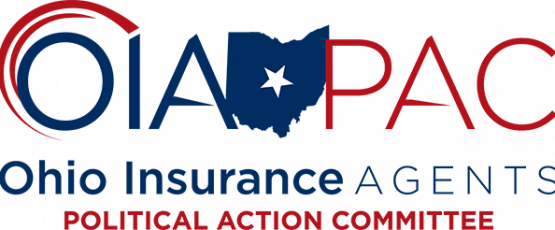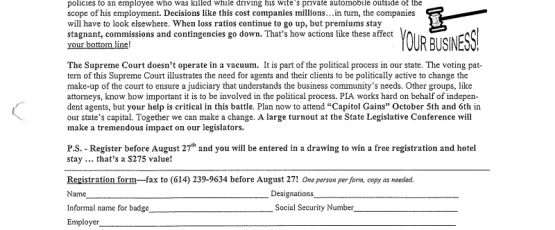Heartbroken – that’s how I felt as I saw the devastation left by the tornadoes that ravaged Indian Lake. Last month, alongside Our CEO, Jeff Smith, ODI Director Judi French, and several ODI staff members, we ventured into downtown Indian Lake to witness the aftermath firsthand and offer support to the local OIA members and community. The experience left an indelible mark on me, deepening my empathy for the resilient residents as they strive to rebuild their homes, businesses, and lives in the wake of this natural disaster.
Our journey through the affected areas, guided by local agents, revealed a heartening display of community spirit. Independent insurance agents, nearby businesses, and multiple insurance carriers united to extend a helping hand. However, amidst this solidarity, a troubling sight emerged at every turn: yard signs promising “Free Roof,” “Immediate Work,” and assurances that “Insurance Will Pay for Roof.” The proliferation of these signs sparked a surge of anger within me, as they showed all the signs of storm scammers preying on the vulnerable.
In the aftermath of severe weather events, reputable contractors often canvass neighborhoods, offering to restore damaged properties. Yet, alongside these reputable individuals lurk unscrupulous operators, eager to exploit homeowners’ distress. Armed with false promises and deceptive tactics, they coerce residents into hasty decisions, often absconding with payment or delivering subpar workmanship, if they even did any work at all.
The plight of those victimized by such practices demands urgent action. The Ohio legislature must protect its citizens by enacting Senate Bill 77 into law. This legislation, modeled after the National Conference of Insurance Legislators (NCOIL) guidelines, aims to establish rigorous standards for roofing contracts and safeguard consumers from fraudulent practices.
The bill’s intent is to establish minimum standards for roofing contracts and promote fair and honest practices in the roofing services business. Twenty-seven states, including all states contiguous to Ohio, have already enacted a version of this bill.
Key provisions of the bill include:
- Requiring Contracts: SB 77 establishes requirements for any roofing contract exceeding $750 dollars. It will require these contracts to be in writing and to include important information such as the contractor’s information, the contractor’s insurance coverage, an itemized description of the work to be done, an approximate total cost the consumer is expected to pay, and prohibits a deposit of more than half the contract price.
- Right to Cancelation: SB 77 allows consumers to cancel a contract within three business days after it is signed by all parties. With “storm scammers” making hard sales in the wake of a disaster when people are most vulnerable, we believe a “cooling off” period helps consumers make sound decisions and reduce the likelihood of being scammed.
- Protecting Ohioans: Being properly insured protects consumers, workers, and businesses, SB 77 would require roofing contractors to have workers’ compensation insurance and contractors’ liability insurance. The contractor would also be required to maintain a list of all subcontractors along with their information from any contract during the past three years.
- Prohibiting Nefarious Practices: This proposed legislation would prohibit roofing contractors from:
- Advertising, promising to pay, or rebating any portion of an insurance deductible as an inducement to the sale of goods or services.
- Offering or providing any upgraded work, material, or product not specified in the contract, paying to the consumer or any other person directly or indirectly associated with the property in question, any form of compensation.
- Reporting, adjusting, or negotiating a claim on behalf of the consumer or receiving compensation for referring a claim to any person who reports, adjusts, or negotiates a claim on a consumer’s behalf.
- Seeking or obtaining a power of attorney on a consumer’s behalf.
- Offering or advertising to represent, negotiate, obtain, or attempt to obtain an assignment of claims, rights, benefits, or proceeds from a consumer.
- Strengthening Enforcement: A contractor’s failure to comply with the bill constitutes a deceptive act or practice in connection with a consumer transaction under Ohio’s Consumer Sales Practices Act.
OIA, with industry partners, will continue to advocate for this vital legislation. We urge individuals to remain vigilant and report any suspicious activity of storm scammers to the authorities. Together, let us fortify our communities against exploitation and ensure a path to recovery built on trust and resilience.
Please contact John Wells, OIA’s Government Affairs Manager, at john@ohioinsuranceagents.com with questions on this issue or any advocacy issues.






